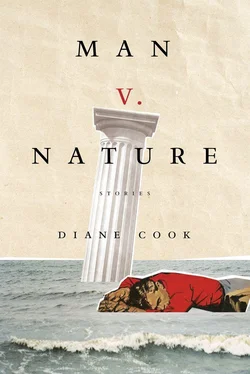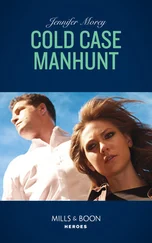We vow to one another not to let it get us alive; that we won’t cower in fear and be taken; we fought this long. We will jump when it forces the roof door open. We will jump together on the count of three. We are executives, dammit, and this is our building, our company. The carnage in the hallways and stairwells is our carnage; those were our employees.
We stand wind-shocked at the building lip. The sun shrinks behind grim clouds. “I will look it right in the eye,” someone resolves weepily. We grit our teeth.
The door cracks ever so slightly, slowly, as though it relishes these final moments. Our protective stack of garbage tumbles. “Remember, on three,” someone chokes.
Then Roger says, “Wait. Here’s an idea.” He steps off the ledge and faces us. “Imagine.” He holds his hands out like he’s positioning a portrait; a portrait of his idea.
We’re trembling. We’re wetting ourselves. But we’re listening.
“Ask yourselves this: Does it really want to kill us?”
Harsh orange light from the stairwell seeps into the gray sky as the door opens more. It seems to be there, just behind shadow, gathering itself.
Did you see the stairwell?
The new hires are just fluid now.
Roger puts a hand up to quiet us. “I know, I know. But we’re top tier. Up here.” He plateaus a hand above his own head. “We’re executives.”
So were Stan and Susan.
Roger shakes his head. “They lost focus. They lacked leadership. Now look at them,” he says. “Trust me. We’ve got something it can use. We’re golden.” Then he humbly scrunches his shoulders as if to say, But what do I know? which is pure Roger, because he can clearly hear the murmur of dissent he has sparked. He rocks back and forth on his wing tips, smiling. Roger loves mixing it up.
Someone starts the count.
“One.”
We clasp hands. Some of us squeeze our eyes shut.
“ Wait, let’s think about what Roger said,” a voice pleads.
It’s quiet up here on the roof above a city with no people. The only sounds now are its harsh breath behind the splitting door; the creaking of city buildings that, lightened of their human loads, now sway easily in the wind; and Roger, whistling.
We hear someone say “Two.”
Now, hold on.
We want to be sure.
Blood-slick talons curl around the door. But thanks to Roger, some of us can only see them as friendly talons, potential-business-partner talons. Our hearts bassoon in our ears. There is movement on the ledge. Some fingers are panicking out of the hands they’re holding, while others are scratching to hold on. Our exhales are ponderous; they churn the wind. Down the line, negotiations begin. Will some latent instinct kick in before our bodies meet concrete? That is our hope; but there is no guarantee. And if we survive the jump, will life in this new world be worth living? Hard to say; we’d need some polling done. Will we be one last flesh dinner for it if we stay? There is always that risk. Is Roger right? “I’m right,” says Roger. Then what should our course of action be?
Well?
It’s coming.
Let me think.
We surprise ourselves by wishing Stan and Susan were still here. Roger claims they lacked leadership, but they went with their guts. They took risks. They yearned and they followed through. They ate the noodles , we realize, and are pleased with our metaphor. Sure, they came to a terrible end, but under all that blood and those tears, we swear we saw a peace like nothing we’ve ever known. We would have loved to feel that kind of peace. But look, now the door has opened, and it’s coming fast.
METEOROLOGIST DAVE SANTANA
More than once when watching Dave Santana give the local weather report, Janet put her hands in her pants. On the day he introduced the new weather screen — over which he smoothed his hands, bringing clouds in from the west or heavy rains south instead of moving Velcro-backed pictures of happy suns or mischievous-looking puffy clouds — Janet imagined she was the weather screen as she bounced astride the arm of her sofa.
But during the winter’s first nor’easter, Dave Santana was on the air five whole days, in hourly updates and long talk spots during the regular news. And Janet’s slender vibrator waited in her robe pocket or under the band of her underpants: at the ready, both necessary and a privilege, like a limb.
He’d carried them through the storm. From the first weather watch, through preparations, to the storm itself and its sad aftermath. Sad because people lost their homes, some even their lives, but Janet thought Dave looked sad because it had to end. As if he was thinking, as he recapped those tragic days, about getting into his car and going back to the condo he’d bought with his meteorologist’s paycheck, which was big enough to support a family though he was a bachelor, and making some macaroni and cheese and watching reruns until he fell asleep. A moment of greatness he’d commanded was over through no fault of his own. She could relate. She tried to guide her students; she was a paragon in the area where their mothers had failed them — how to really have it all. But she could only teach them so much. When a few of them inevitably got pregnant by senior year, it felt like a personal blow. This disappointment that she and Dave shared — this synchronicity — aroused her.
Though he was classically unattractive — short and balding, his light-colored skin and hair hardly distinguishable from one another, and his eyebrows almost nonexistent — he was a New Englander. She appreciated the spirit of men from the Northeast. They didn’t have the dreaminess of men from the Plains, where the sky was so big they got lost in it; or the lethargy of men from the Northwest, whose brains were rotted by rain; or the Southwest, where men strove to be coarse and dry. She’d been with them all. Men from the Northeast were practical, they could handle anything because they lived through the worst winters, hottest summers, and most beautiful falls. New England men bore all things. There was nothing quite as exciting to her as when Meteorologist Dave Santana let the word nor’easter roll out of his mouth, all juicy with meaning and menace, like a slick tongue. Plus, he was her neighbor.
With the storm pushed out, the winds flattened, and the skies no longer in need of interpretation, Janet waited for him to return to his town house, so torturously close. She hoped he’d still be bearing the disappointment that any end brings. She knew she could make him feel better.
When Dave Santana arrived, Janet slipped into her robe and opened her front door to icy air; she watched him gather his things from his blue compact and cleared her throat.
Dave startled. Then an expression settled on his face when he saw her — one she would have liked to think was mild pleasure, but she knew better; it was a mild something else. She had been to the door many times in the past year, inviting him in for drinks, to change a lightbulb, to kill a field mouse. Mostly, she tried to force herself upon him and each time was rebuked. “Janet, I’m tired,” or “I have to wake early for the fisherman’s forecast.” Once he grabbed her wrists angrily, saying, “I’m a meteorologist ,” as if that alone should explain some principle to her. Was it that he was too good or too lowly for her? But the last time, after liquor was plied, something more happened. A fondle, a kiss, timid at first, then lingering, as if Dave Santana was deciding something. Then he scrunched his face and left. For weeks after, she stopped trying, told herself she wasn’t that pathetic, and romped with some easies from a bar she liked in the next town. But this nor’easter and Dave’s commanding presence on her television night after night after night broke her. She yanked the neck of her robe so it was loose and low.
Читать дальше












